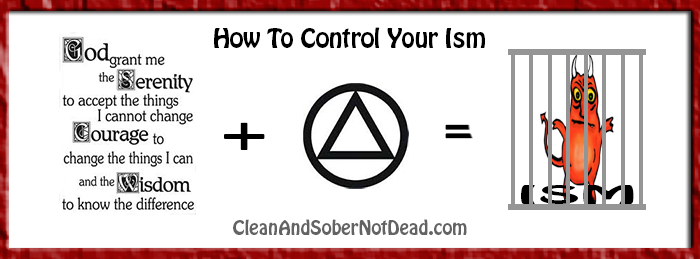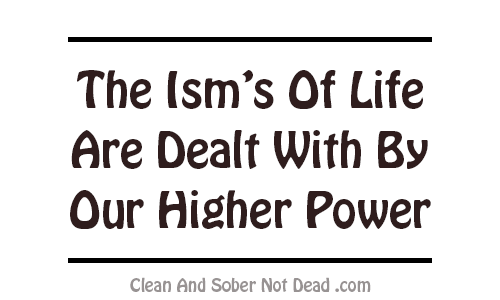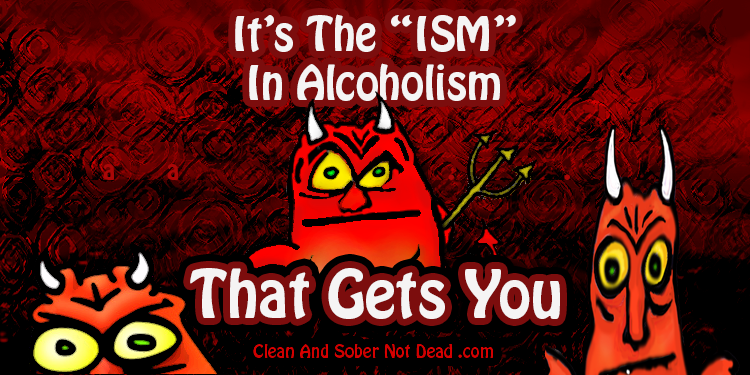Alcohol is only a symptom of the disease alcoholism. You can take the alcohol out of alcoholism but what is left is the “ism” part of this disease. The ism is why we drank, the ism is what feeds the inner committee chaos and the ism keeps us uncomfortable and acting out in an inappropriate manner. The ism will get you drunk again and again if not addressed in recovery.
Good acronyms for ism are : I, Self, Me or I Sponsor Myself or Internal Spiritual Malady (or Maladjustment), or Incredibly Short Memory or InSide Me or I Sabotage Myself. Bill W. and Dr. Bob, were clear about the supreme problem of alcoholism. They called it “spiritual bankruptcy” which is just another way of saying our alcoholism is a result of an ism (internal spiritual malady).
The disease—the ‘ism’ of alcoholism—involves more than the act of drinking alcohol. The ism is what the recovering alcoholic has to address daily in their reprieve from alcohol in their successful journey of sobriety. Recognizing the ism’s for what they are and addressing them appropriately is a vital part of recovery.
Most alcoholics, for whatever reason, can’t seem to cope with the normal ups and downs of life without drinking alcohol. This inability to cope normally with life without alcohol is the “ism” part. The underlying motives of the alcoholics isms can be addressed in recovery and tools learned so they can be addressed appropriately without drinking.
The ism of alcoholism stays with us for life. It will remain very much alive and well even after one stops drinking. You can take the alcohol away from an alcoholic and unless they have also addressed their ism’s then they still continue to have the same traits and characteristics they had when they were a drinking alcoholic. Not only do the ism’s continue to stay with us after one quits drinking, ones can develop new ones that were never present before. We can only hope to put the ism at bay every day by working the 12 steps of Alcoholics Anonymous. This is why we way we are recovering alcoholics no matter how long we have been sober. We do not say we were alcoholics and are have now recovered.

Any complacency dealing with one’s ism is perilous after all the ism is why we drank. The Ism has to be addressed. We need a new way of thinking and a new way of coping. We need a new way of life. Alcoholism can be treated and kept in remission if the identified person is willing to take certain significant steps. First, is admitting they have the problem. Second, is going through the process of rehab and recovery. The final part is addressing the “ism” part of their alcohol problem.
Everyone has Ism’s to varying degrees as they are part of life. We have ism’s in an attempt to make life tolerable, as a way to try to control behaviors, thoughts, actions and/or feelings and as a coping mechanism. This is, of course, what we all strive to do on a day-to-day basis, we need these thinking patterns and behaviors’ to cope. The normal person seems to be doing alright with their ism’s while the alcoholic seems to be having difficulties dealing with theirs. In short, the “ism” is all about the alcoholic and how they cope with the many things encountered in life.
The alcohol part of the alcoholism is a self induced illness, something the alcoholic brings upon themselves every time they take a drink. The ism part of alcoholism is emotional and mostly fear based in origin. The ism is that wretched feeling of restlessness, inadequacy, isolation, hopelessness, anxiety, depression, shame, fear and guilt the alcoholic feels and deals with inappropriately. The ism involves more than the act of drinking. On top of all those feelings the alcoholic can take self-centeredness to the extreme, be egotistical and have visions of self grandeur. Other isms emerge in unflattering displays of over-reaction often blaming others and defending oneself from perceived threats and fears.
All of these feelings and perceptions are internalized and manifested in contorted forms of the alcoholic reality. All of those feelings are parts of the disease. Alcoholics do not feel at-ease but feel dis-ease. Diabetes is a disease but alcoholism is a dis-ease. Having the dis-ease is the opposite of at-ease. The ism of alcoholism is a problem of the mind
One of the main ism’s with alcoholism is the ism of fear. There are many types of fears. Fear of failure, fear of commitment, fear of failure, fear of loneliness, fear of intimacy, fear of risk, fear of pain, fear of abandonment, fear of rejection, fear of looking/sounding stupid, fear of what someone might think, fear of punishment, fear of poverty, fear of exploitation, fear of missing the big chance and the fear of fear to name a few. A big part of recovery is mostly about recognizing our fears and learning better ways to address our fears in a more healthy manner.

Through working the 12 steps to the best of our ability we are given new tools to learn how to let go of fear and trust in our Higher Power. Having faith that our Higher Power is always there for us and is always available. Knowing our Higher Power has a plan and a will for our lives, even in the fearful moments. To have faith in your Higher Power means you trust he is big enough and powerful enough to see one through any situation. When one doubts that the Higher Power is big enough, they try to become their own higher power and handle the situation in the inappropriate and broken ways that kept them drinking in the first place. That is when one’s serenity and even their sobriety are in jeopardy. If the alcoholic is going to stop drinking and lead a relatively normal life, they need to realize it is a process of changing the way they deal with life and its myriad of problems.
With knowledge and self awareness of all the many ism’s of alcoholism one can recognize when they are acting from fear, or about to act from fear and address them in healthy manners. If your ism’s are acting up and you are feeling uncomfortable, pause and step back from the situation. Take a look at what is really going on and determine if fear has anything to do with the situation at hand. Is there a fear at the root of what I’m doing, thinking or wanting to do? See it for what it is truly and deal with it appropriately, not by acting out and responding badly. Recovery works when this “fear check-up” is the first response to a fear producing situation. Don’t let the fear overwhelm you or make you act out of fear as our ism would lead us to. We have better options that keeps life manageable and us sober another day.

Sometimes identifying other emotions such as anger, self-pity, distress or worry helps identify the root fear they are dealing with. One may need to detach from what or who is causing the anger or fear, face the fear or let go and let God take care of what is worrying your and keeping you in distress.
Start at Step One, admitting powerlessness is crucial in dealing with fears. Then proceed to Step Three where having faith in your Higher Power and trust he is going to take care of the situation at hand. Finally we continue the process of conquering our ism by doing the actions that keep us sober. We work the 12 steps, make meetings, read our big book, work on our identifying our character defects, talk to our sponsor and/or work with another alcoholic/addict..
Ultimately the situation will pass, we stay sober while going through the ordeal and act more appropriate during the entire process surprising many.




